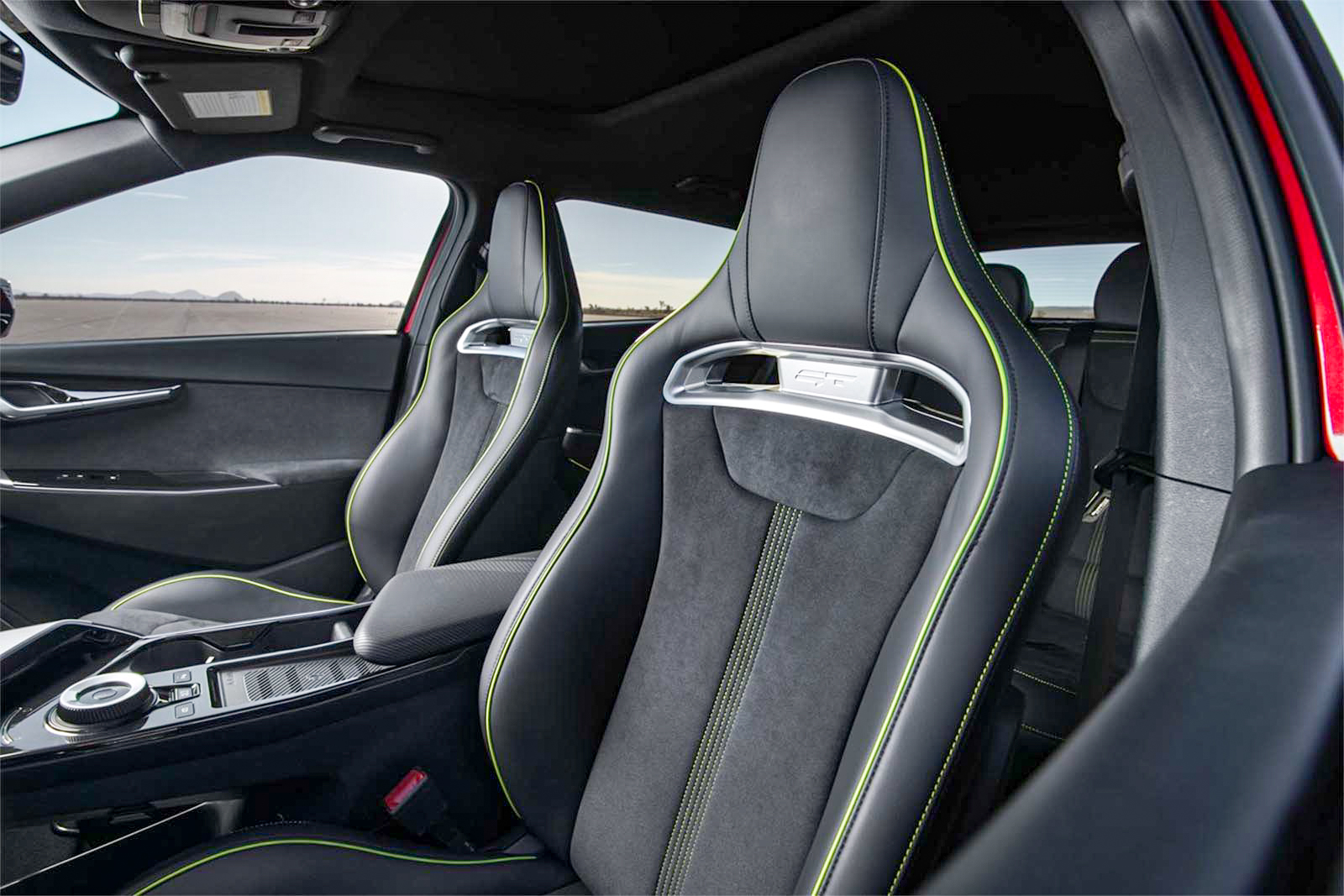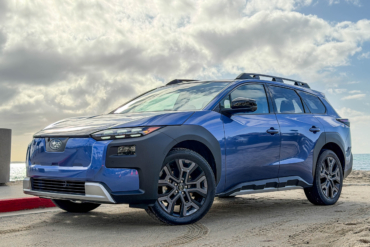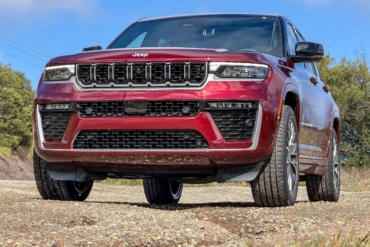The Kia EV6 has been winning over buyers looking for a stylish EV offering plenty of features, good range, and a reasonable price tag. Now, with the EV6 GT, the Korean carmaker ups the ante by adding supercar performance and a new drift mode. But there are a few sacrifices.
You might be laboring under some serious misconceptions, especially when it comes to EVs. Indeed, the first generation of battery-electric vehicles could barely get out of their own way, with sluggish acceleration, minimal range, cramped interiors, a dearth of features, and typical strange styling.
The Kia EV6, which launched earlier this year, is another matter entirely — with handsome styling, a roomy and well-appointed cabin, up to 310 miles of range (depending on the trim package), and plenty of desirable features.
Now, the Korean automaker is adding performance to the mix with the 2023 Kia EV6 GT punching out a neck-snapping 576 horsepower.
I spent a day pushing the Korean electric supercar to its limits at the Las Vegas Motor Speedway, while also checking out how it handled on local roads. There are a few trade-offs, starting with a nearly one-third reducation in range. But the GT is likely to win over plenty of folks who’ve never considered an EV until now.
In short: There’s a good reason why Kia can’t keep up with demand for the new EV6 crossover. And performance fans will discover yet another reason with the debut of the 2023 Kia EV6 GT. It’s more powerful than the competing Mustang Mach-E GT with Performance Pack, and quicker off the line than a Porsche Taycan GTS. But its battery pack drains fast if you’ve got a lead foot, which makes its fast-charge electrical system all the more desirable.
2023 Kia EV6 GT Review

Something Unexpected This Way Comes
Kia first ventured into the EV market with a battery-powered version of the quirky Soul crossover, later adding the Niro. This was the only model on the market available with a hybrid and plug-in hybrid, as well as a purely electric drive option.
The EV6 is the brand’s first dedicated battery-electric vehicle. It shares the same underpinnings (like the E-GMP architecture) with sibling brands Hyundai and Genesis.
The EV6 was initially offered with several trim packages, starting with the rear-wheel-drive EV6 Wind and, on the more premium side, the EV6 GT-Line. But it hinted at better (read: more powerful) things to come. It’s about to arrive in U.S. showrooms in the form of the all-wheel-drive 2023 Kia EV6 GT.
Previously, Kia focused on what was euphemistically known as “cheap and cheerful” products. They were small, no-frills offerings with fire-sale prices. Over the decades, Kia has consistently moved up the market.
The original Kia EV6 was no slouch, delivering as much as 320 horsepower and 446 pound-feet of torque. But the EV6 GT takes things to the next level. That’s especially true on the performance side. The all-electric crossover pushes 576 horsepower and 545 pound-feet of torque. That makes it not only the most powerful model Kia has ever offered but also puts it in a league with dedicated performance EVs like the Mustang Mach-E GT and even the Porsche Taycan GTS. Both are slower than the EV6 GT when launching from 0-60.
Kia EV6 GT: A Powertrain Package for Performance Junkies

All that torque comes on fast. That’s one of the key benefits of electric motors, with a smooth, linear feel that will launch you to 60 in a mere 3.4 seconds. Keep your right foot firmly on the floor and you’ll top out at 161 mph.
While all-wheel drive is an option for mainstream versions of the Kia EV6, it’s standard with the GT, and tuned specifically for maximum performance. With its electronically controlled limited-slip differential, the crossover can direct torque wherever it’s most needed to deliver not only a quick launch but also maximum grip.
That’s further enhanced by the 21-inch alloy wheels shod in Goodyear Eagle F1 tires.
EV6 GT Drive Modes

The EV6 GT adds a customizable My Drive Mode, a GT Mode triggered by a bright yellow button on the bottom right of the steering wheel, and even a Drift Mode.
When drifting, the GT’s electronic control system can completely cut off power to the front axle. It will then apply front power, as necessary, to keep the vehicle under control.
As with more and more new battery-electric vehicles, the EV6 family features adjustable regenerative braking, which recaptures energy normally lost during braking and coasting, sending it back to the battery pack to extend range.
In its most aggressive 1-Pedal mode, a driver will be able to modulate the throttle to slow, or even stop, rather than jumping back and forth from throttle to brake. With the GT, regen becomes even more aggressive — useful when you’re charging hard corners on track or off.
Kia makes sure its top-performance model can stop under all conditions by upgrading the conventional, friction side of its brake system. That includes 14-inch ventilated rotors on the back wheels.
A Trade-Off on Range, But No Compromises on Charging

When you’re drawing power from a battery, large motors and aggressive driving require a trade-off in range. The Wind and GT-Line models get a maximum of 320 miles per charge. The Kia EV6 GT manages a mere 206 miles, according to the EPA. And that’s while taking it slow and easy.
Put it out on the track, or run a series of quarter-mile runs — as I did on the dragstrip at the Las Vegas Motor Speedway — and you can watch the battery gauge drop fast.
That’s the case with gas-powered sports and muscle cars, of course. But, as with most EVs, Kia has a cutoff point at which it effectively detunes the electric powertrain. That happens when you drop below a 70% state of charge. It remains reasonably quick but just a bit less aggressive.
The good news is that you can power up the battery fast if you’re near a DC fast charger.
Like Porsche, the automaker sprang for an electrical system that can handle as much as 800 V, unlike most other manufacturers who top out at 400. Plug it into the most powerful 350kW chargers and you’ll jump from a 10% to 80% state of charge in as little as 18 minutes. Even with the more common 150kW charger, the EV6 GT’s 77.4kWh pack will be replenished in a still-reasonable 21 minutes.
Of course, using the standard Level 2 home charger, at 240 V, will require an overnight plug-in to hit 100%.
Driving Impressions

The all-wheel-drive Kia EV6 Wind and GT-Line models are reasonably fun to drive, with smooth, linear acceleration that will get you to 60 in around 6 seconds.
The GT is another matter entirely, cutting launch times nearly in half, at 3.4 seconds. Aside from the Mach-E GT and the Taycan GTS, that even beats the Lamborghini Huracán RWD Spyder, Kia officials were quick to boast at a recent media drive.
I was curious to see if I could match that during my visit to the Las Vegas Motor Speedway.
Admittedly, my reflexes have slowed as I age, but I matched the Kia number during my fastest run, while logging a best-of-the-day quarter-mile in just over 11.5 seconds. That’s an equally impressive number, crossing the traps at just over 119 mph. Some colleagues got down to the 11.4-second range and a top speed of 121 mph.
The GT was also impressive on the speedway’s serpentine road course. It allowed me to hit triple-digit numbers on the long straights while maintaining composure going into the corners. The e-LSD and other nanny features, while dialed back in GT Mode, came to life when needed, keeping the nose of the Kia crossover pointed precisely where I wanted.
I also dialed things back during a couple-hour tour on public roads that took me from the Las Vegas Strip out to the Valley of Fire State Park near Lake Mead.
Most impressive was the dual nature of the EV6: a devil on the track and an angel on local roads.
Some credit goes to the GT’s responsive steering. But even more impressive was the electronically controlled damping system that would hunker down when driven in aggression, then loosen just enough to soak up bumps while out cruising.
Subtle Tweaks to the Exterior

The GT does add a few appealing details, like a larger rear spoiler and diffuser. Also, those 21-inch wheels and tires, and the neon-green brake calipers.
But the overall look isn’t that much different from the more plebian EV6 trim packages. They all adopt Kia’s “Opposites United” design language first introduced on the brand’s updated Stinger model.
The familiar Kia “tiger nose” grille becomes the new “Digital Tiger” design. The GT adopts a unique front and rear fascia meant to give it a more aggressive appearance and emphasize the crossover’s width.
It’s easy to see the influence of range-extending aerodynamics, from the closed front grille to the pop-out door handles.
What you won’t initially find is the frunk (front trunk) under the hood. That’s one of the benefits of the E-GMP platform. It moves most powertrain components under the load floor, freeing up space normally eaten up by an engine compartment.
A Sophisticated, Roomy Cabin

With no engine up front, designers could make other useful tweaks to the Kia EV6 line, including the GT. While the crossover may look relatively compact, it actually has the same wheelbase as the brand’s big, three-row Telluride at 114.2 inches. And it has a midsize cabin, at 102 cubic feet for passengers and another 27.7 cubic feet for cargo behind the second row.
There’s good headroom, front and back, a flat load floor, and a full 39 inches of legroom for rear passengers.
While the performance model makes trade-offs on range, it also gives up the memory power seats found in the Wind and GT-Line trims.
But the trade-off is worth it considering the way the GT’s manually operated sport seats envelop you, keeping you firmly in place during aggressive driving maneuvers. They’re reasonably easy to get in and out of and proved quite comfortable after several hours of on-road driving.
The overall look of the GT’s cabin is minimalist yet surprisingly luxurious, with vegan leather surfaces and distinctive stripes on the console and upper instrument panel.

But the eye is most likely drawn to the twin 12.3-inch digital displays that dominate the IP. Both are reconfigurable and add unique gauges and other features programmed specifically for the performance model.
While the infotainment touchscreen is used to operate many key vehicle functions, Kia wisely retained some manual controls — primarily for climate functions and to set volume.
Plenty of Tech in the 2023 Kia EV6 GT

The twin screens are the most obvious high-tech feature, but there are plenty of others, including some offered as standard gear solely on the EV6 GT.
The performance crossover gets a hands-free power liftgate, Qi wireless smartphone charging, and an available Wi-Fi hotspot along with both Apple CarPlay and Android Auto. You can also pair the car to either an Apple or Android smartwatch to track vehicle information, such as charge status or to set up charging.
The EV6 links to the Alexa voice assistant. That allows an owner to remotely start heating the cabin on a cold day while the crossover is still plugged in, saving range.
The 2023 Kia EV6 GT also gets a standard 14-speaker Meridian premium audio system, as well as an augmented-reality head-up display. When using the onboard navigation system it projects arrows that seemingly float out front of the vehicle to show you precisely where to make a turn.
The GT also gets a full array of advanced driver assistance systems, such as forward collision warning with auto-braking, remote smart parking assist, blind spot assistance, and highway driving assistance, among others.
The crossover is one of the first EVs to offer “Vehicle-to-Load” functionality. This lets you take energy out of the battery pack, perhaps to run a cooler or cooktop at a campsite. Or, if needed, to keep a refrigerator running at home, should you lose power.
2023 Kia EV6 GT Review Wrap-Up

The 2023 Kia EV6 is an impressive vehicle that, in its various forms, has started winning people over. Even those who are just beginning to think about going electric. And, with its supercar performance, the EV6 GT is bound to expand the crossover’s appeal.
The EV6 GT carries a price premium, though not as much as you might expect when factoring in all the features standard on lower trim levels. It starts at $61,400, a $4,000 step up from the all-wheel-drive version of the EV6 GT-Line. (Add $1,295 for delivery fees.)
It’s an even better deal when you compare it to some of the other performance EVs now on the market. The Tesla Model Y Performance edition, for one, starts at $69,990, while the Mustang Mach-E GT with Performance Pack comes in at $75,895. While it’s not quite an apples-to-apples match, the Porsche Taycan GTS starts at $134,100.
Kia claims to have already logged a substantial number of hand-raisers since announcing plans for the EV6 GT earlier this year. So, it’s easy to anticipate the performance EV will sell out quickly considering the plan calls for just 2,000-2,500 to be shipped to the U.S. next year.
Kia officials have hinted they could bump those numbers up if the demand is there.








